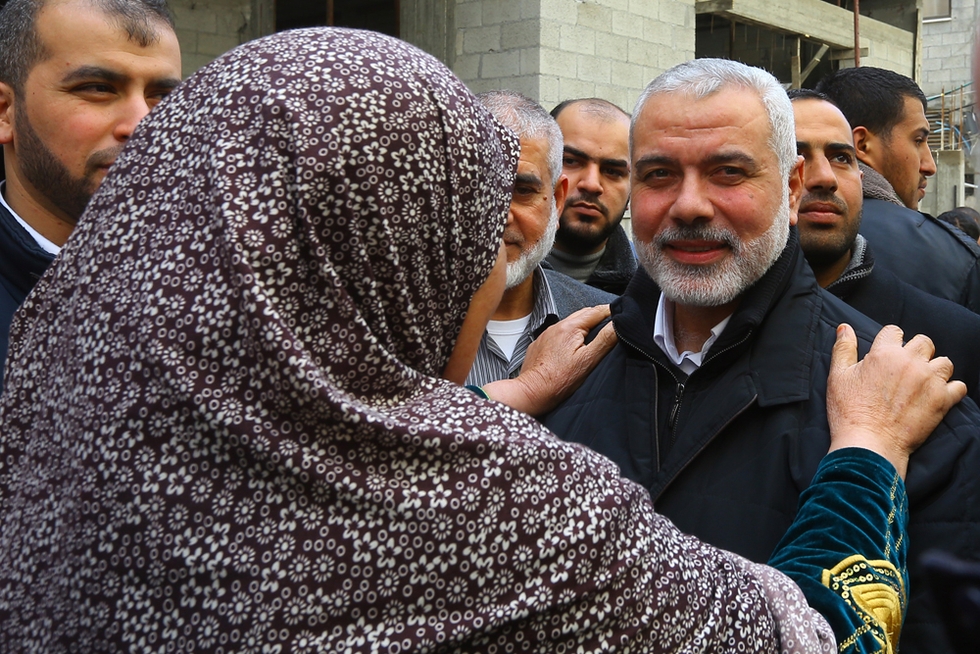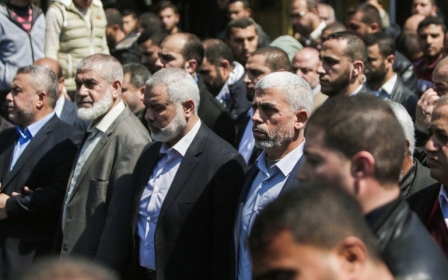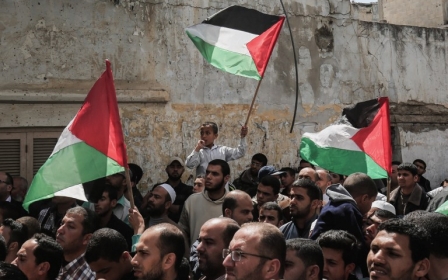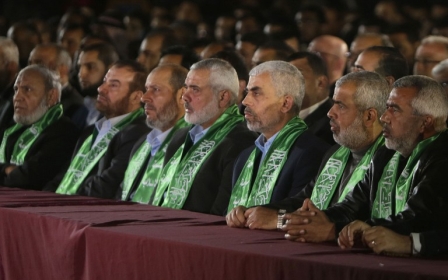Ismail Haniyeh elected new political leader of Hamas

Hamas's former chief in Gaza, Ismail Haniyeh, has been elected overall head of the Palestinian group, succeeding Khaled Meshaal, its official media agency announced on Saturday.
He is expected to remain in the Gaza Strip, the Palestinian enclave run by Hamas since 2007, unlike Meshaal, who lives in exile in Doha and has completed the maximum two terms in office.
"The Hamas Shura Council on Saturday elected Ismail Haniyeh as head of the movement's political bureau," the Hamas media agency said.
Gaza-born Haniyeh, 54, served as Palestinian prime minister after the group's victory in 2006 polls and continued to claim the title despite being officially sacked by Palestinian president and Fatah chief, Mahmoud Abbas.
Haniyeh's election came days after his movement released a new document revising the political views of its founding charter.
It calls for the Palestine Liberation Organisation to be a "national framework" for the Palestinian people, accepts a Palestine state within borders determined by the 1967 Arab-Israeli war, and states it's main enemy is the "Zionist project of occupation," not the Jewish people.
Leila Seurat, a researcher at the Paris-based Centre for International Studies and Research, said the election was a shift for the movement, which had been directed from Doha and from Damascus since Israel assassinated founding father Sheikh Ahmed Yassin in Gaza in 2004.
"His election is a sign that the Gaza leadership has regained the upper hand from those outside," she said.
Haniyeh beat contenders Mussa Abu Marzuk and Mohamed Nazzal in the vote.
Hamas is under increasing pressure in Gaza as it struggles under a blockade by Israel and what it says is a campaign by Palestinian leaders in the West Bank to undermine its authority.
In recent weeks, the Palestinian Authority, led by Abbas, has cut the wages of state employees in Gaza by up to a third while also informing Israel it will no longer pay for electricity being sent to Gaza.
The PA states the measures are necessary due to a drop in international funding.
Islamic Jihad rejects Hamas's new direction
The Palestinian group Islamic Jihad meanwhile rejected Hamas's new policy of easing its stand on Israel and accepting the establishment of a Palestinian state limited to the 1967 borders.
"As partners with our Hamas brothers in the struggle for liberation, we feel concern over the document," which the main Islamist movement that rules Gaza adopted on Monday, said Islamic Jihad's deputy leader, Ziad al-Nakhala.
"We are opposed to Hamas's acceptance of a state within the 1967 borders and we think this is a concession which damages our aims," he said on Islamic Jihad's website.
Nakhala said the new Hamas policy formally accepting the idea of a state in the territories occupied by Israel in the 1967 Six-Day War would "lead to deadlock and can only produce half-solutions".
Hamas has eased its stance on the Jewish state after having called for decades for its destruction, as the movement seeks to improve its international standing.
Founded in 1979 in the wake of the Islamic revolution in Iran, a close ally and source of its ideology, Islamic Jihad is the second force in the Gaza Strip and focused entirely on the armed struggle.
Egypt re-opens Rafah border crossing
Egypt on Saturday reopened the Rafah border crossing with the Gaza Strip for three days to allow hundreds of stranded Palestinians to return home, officials said.
The move, described by Palestinian border officials as a "humanitarian" gesture, will allow Palestinians stranded in Egypt and elsewhere, including students and sick people, to return to Gaza.
"Egyptian authorities reopened the Rafah crossing for three days only, from Saturday until Monday, and only in one direction to allow those stranded on the Egyptian side to return home," a statement said.
The Gaza Strip has been under an Israeli blockade for a decade. Palestinian militants in Gaza have fought three wars with Israel since 2008.
The Rafah crossing is Gaza's only gateway to the outside world not controlled by Israel, but it has remained largely closed in recent years because of tensions between Egypt and Gaza's Islamist rulers Hamas.
Relations between the two soured after the then Egyptian army chief and now president, Abdel Fattah al-Sisi, overthrew his Islamist predecessor, Mohamed Morsi, in 2013.
They have eased this year, however, and Egypt briefly opened the Rafah crossing for humanitarian cases in February and again in March.
The Gaza border authority said on Saturday that "more than 20,000 Palestinian citizens, who are considered humanitarian cases, are stuck in Gaza and desperately need to travel abroad" for treatment.
Middle East Eye propose une couverture et une analyse indépendantes et incomparables du Moyen-Orient, de l’Afrique du Nord et d’autres régions du monde. Pour en savoir plus sur la reprise de ce contenu et les frais qui s’appliquent, veuillez remplir ce formulaire [en anglais]. Pour en savoir plus sur MEE, cliquez ici [en anglais].




